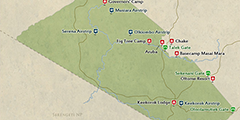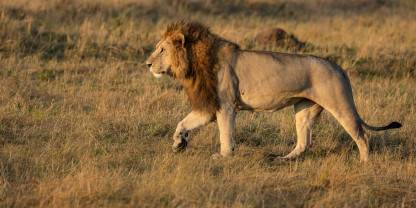Masai Mara National Reserve is one of Africa’s most famous parks and undoubtedly among the continent’s best places to see animals. The wildlife viewing is superb throughout the year. The grassy plains and regular rainfall support a huge population of , in turn attracting many predators. All three are relatively easy to see. The yearly through the park is one of the world’s most amazing wildlife spectacles.

-
Best Time To Go
- June to October (For general wildlife viewing) and July or August to October (For wildebeest migration)
-
High Season
- June to October and December to March
-
Size
- 1,510km² / 583mi²
-
Altitude
-
1,435-2,143m /4,708-7,031ft
 View Photos
View Photos
 View Photos
+24
Photos
View Photos
+24
Photos
 Open Map
Open Map
Pros & Cons
- Excellent wildlife viewing throughout the year
- Annual (from July or August to October)
- Open makes for easy wildlife spotting
- Wide variety of accommodations for different budgets
- Hot-air balloon safaris
- The park gets busy, especially during high season
- The access road is bad, so a is recommended
- Roads can be in terrible condition, especially after rain
The Wildebeest Migration
The Serengeti-Mara ecosystem is where 2.5 million , zebras and follow the rains in search of new grass every year. They make their way from Serengeti National Park (in northern Tanzania) to the Masai Mara, and they usually cross into Kenya in July or August. Although the timing is never guaranteed, August and September are when you’re most likely to see the herds undertaking the famous crossings of the Mara River in Kenya. They slowly head back into the Serengeti around October.
Wildlife
The Masai Mara is one of the best parks in Africa for seeing , especially lions. Even leopards are quite used to vehicles and you can see their natural behavior, while cheetahs inhabit the open , hunting or seeking their next meal. Of the other , elephant and buffalo are also plentiful, but is trickier and they only roam in the Mara Triangle area.
More about Masai Mara's wildlifeScenery
dominates the landscape in the Masai Mara, but there are pockets of and around the Mara River, and rocky hills intersperse the plains. The Maasai word ‘Mara’, meaning spotted, refers to these dots in the landscape. In the west, the Oloololo Escarpment (also called the Siria Escarpment) marks the boundary of the Mara. The stunning views from the top take in the whole ecosystem.
Activities
The main activity on organized safaris is guided . East of the Mara River, dozens of vehicles frequently gather around sightings. Crowding is less common in the Mara Triangle and forbidden in most conservancies. Early morning hot-air balloon rides are very popular. and are forbidden in the national reserve but usually offered in the conservancies. Self-guided game drives are permitted in the Mara Triangle but not in the conservancies. In June 2024, the reserve authorities placed a ban on self-drive activities east of the Mara River. All other safari vehicles are still permitted in the reserve.
Weather & Climate
The Masai Mara has a generally mild climate that doesn’t vary too much from a comfortable 26°C/79°F in the region’s Dry season (June to October). Differences in temperature are mainly due to changes in altitude in the park, with conditions getting cooler the higher you climb. The Wet season (November to May) comprises a shorter and a longer rainy period that are broken up by a brief dry spell.
More about the weather and climateBest Time To Visit
The Dry season (June to October) is the best time to visit the Masai Mara. The roads haven’t yet deteriorated because of rain, and thirsty animals crowd around the local waterways. The last four months of the Dry season are often when the incredible annual passes through. January and February, the interlude between the short and long rains of the Wet season, is also a good time to visit.
More about the best time to visit



